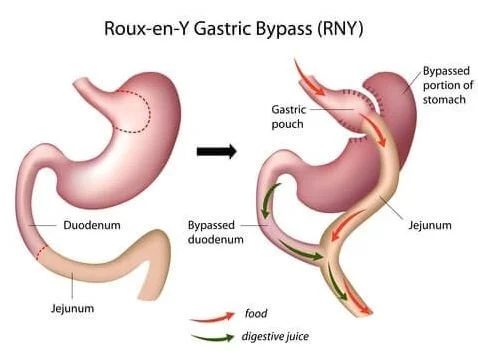
Gastric Bypass
The gastric bypass is generally more effective than many other procedures in resolving diabetes.
The roux-en-y gastric bypass uses both restriction and malabsorption to achieve weight loss, and has long been recognized as an effective, durable procedure.
In the gastric bypass, the stomach is permanently divided to create a small gastric “pouch” that limits the size of meals. The small intestine is then connected to the upper pouch so that food “bypasses” the remainder of the stomach and the first part of the small intestine. This limits the calories and nutrients that can be absorbed.
Unusual risks of the operation include bleeding, leaking or stricture formation at the staple lines (<1% in our practice), ulcer formation, and intestinal obstruction. Dumping syndrome is unique to the gastric bypass, involving nausea, diarrhea, and a weak, uncomfortable feeling when eating certain sweet foods. A 1-2 night hospital stay is common after the procedure. As with all bariatric surgery, vitamin supplementation is important.
$15,000*
• A small stomach pouch is created
• Food bypasses most of the stomach and the first part of the intestine
• Good procedure for reflux and diabetes
• 1-2 night hospital stay
*Inclusive cash price for qualified patients not using insurance.
